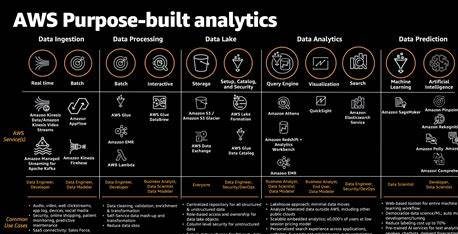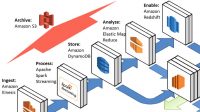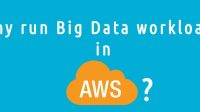In today’s digital age, data is king. Every interaction, transaction, and sensor generates a wealth of information. This data explosion, characterized by high volume, velocity, and variety, presents both challenges and opportunities. Traditional data analysis methods struggle to keep pace with the ever-growing data landscape. Here’s where Big Data Analytics on AWS emerges as a game-changer.
What is Big Data Analytics on AWS?
Big Data Analytics refers to the process of extracting valuable insights from massive and complex datasets. AWS (Amazon Web Services) provides a robust cloud platform that empowers businesses to leverage Big Data Analytics effectively.
At its core, Big Data Analytics on AWS involves ingesting, storing, processing, and analyzing large datasets. Here’s how some key AWS services play a crucial role in this process:
-
Amazon S3 (Simple Storage Service): This is the foundation for storing vast amounts of data in a secure, scalable, and cost-effective manner. It provides object-level storage, making it ideal for diverse data formats, from structured databases to unstructured log files and images.
-
Amazon EMR (Elastic MapReduce): This service facilitates distributed processing of large datasets across clusters of virtual machines. EMR leverages open-source frameworks like Apache Hadoop and Spark, enabling users to analyze data in parallel, significantly reducing processing time.
-
Amazon Redshift: Built for data warehousing and analytics, Redshift is a fast, scalable data warehouse that allows you to efficiently analyze large datasets stored in S3. It offers a familiar SQL interface, making it easy for data analysts to query and explore data.
-
Amazon Kinesis: This service excels at real-time data processing. It continuously streams incoming data from sources like social media feeds, sensor data, and application logs. Kinesis allows you to analyze data in real-time, enabling faster decision-making and near-instantaneous responses to events.
These are just a few of the many AWS services that contribute to a comprehensive Big Data Analytics ecosystem. The specific services you choose will depend on your unique data needs and the type of analytics you intend to perform.
Benefits of Big Data Analytics on AWS
There are numerous advantages to leveraging Big Data Analytics on the AWS platform. Here are some key highlights:
-
Scalability and Flexibility: Unlike on-premise infrastructure, AWS is inherently scalable. You can easily scale your storage and processing resources up or down based on your data volume and processing requirements. This eliminates the need for upfront investments in hardware and ensures you only pay for the resources you use.
-
Cost-Effectiveness: AWS operates on a pay-as-you-go model, eliminating the high upfront costs associated with traditional data warehousing and analytics solutions. You only pay for the storage and compute resources you utilize, making Big Data Analytics accessible to businesses of all sizes.
-
Faster Time to Insights: AWS empowers you to analyze massive datasets quickly and efficiently. The parallel processing capabilities of services like EMR significantly reduce processing times, allowing you to gain insights from your data faster and make data-driven decisions in real-time.
-
Enhanced Security and Compliance: AWS prioritizes data security. It offers a wide range of security features and adheres to strict compliance certifications, ensuring your data is protected and meets industry regulations.





